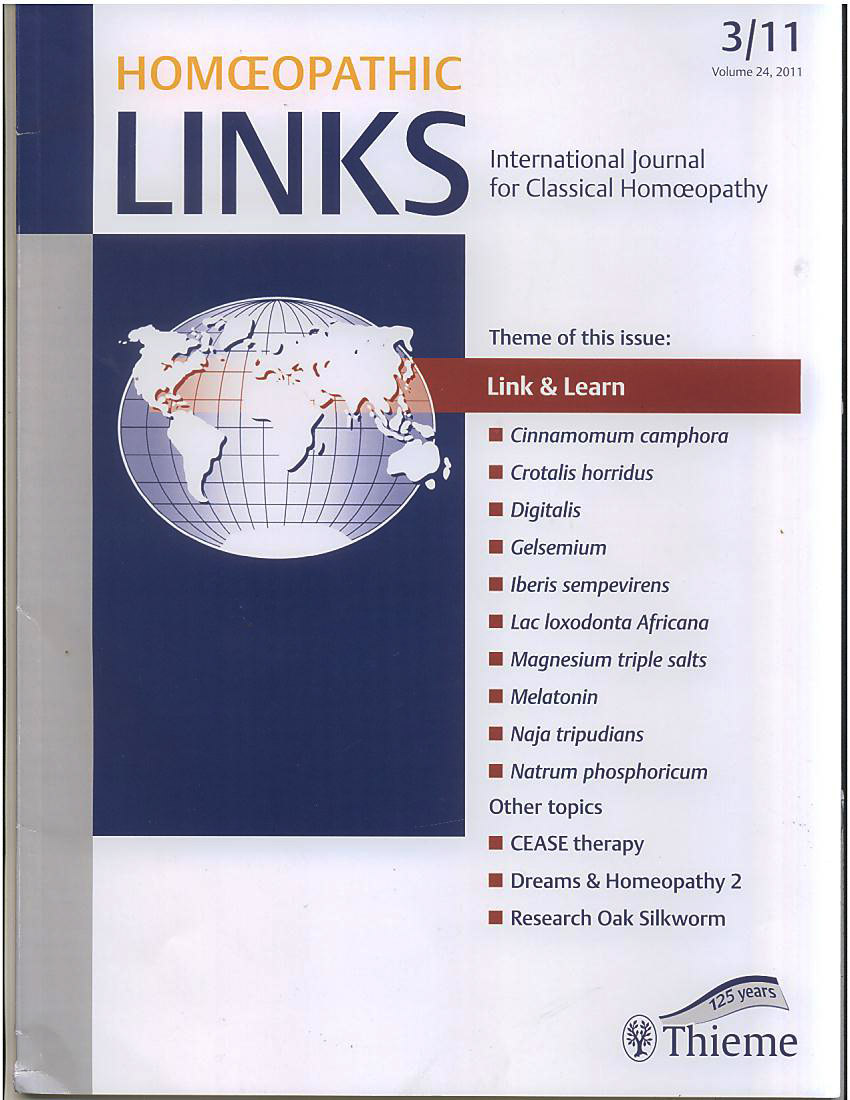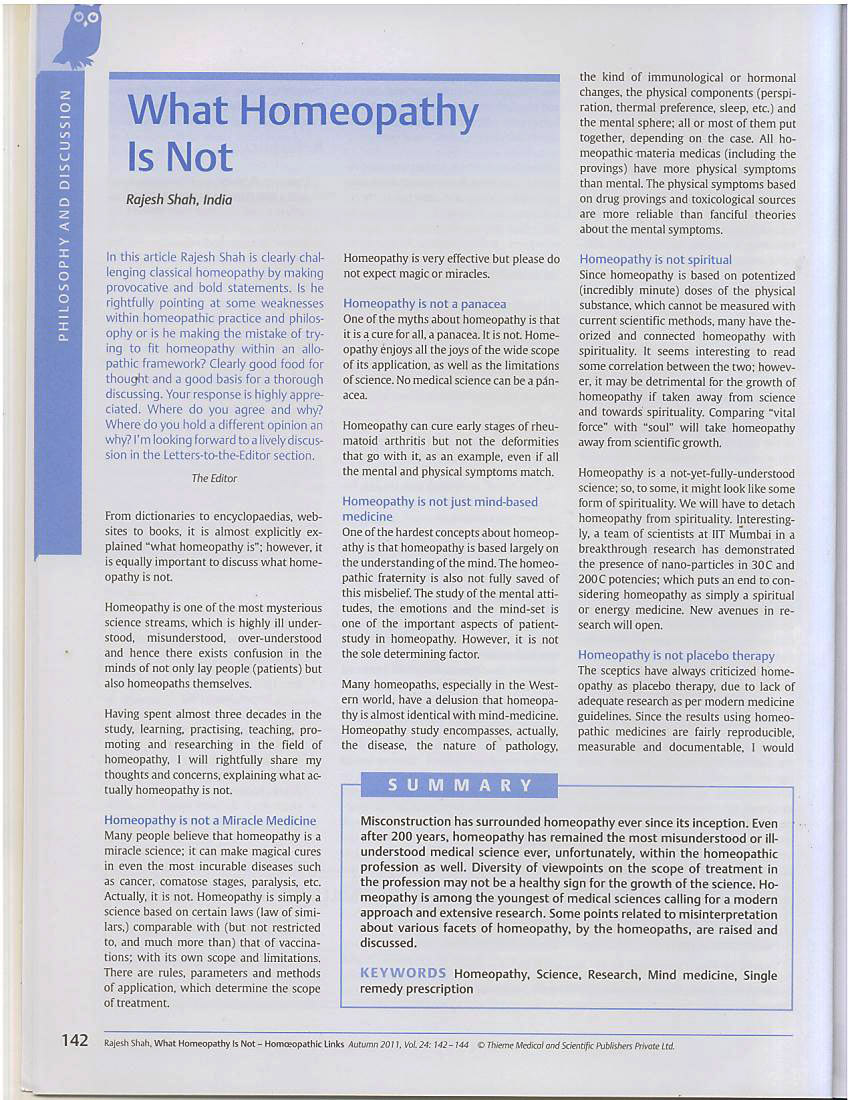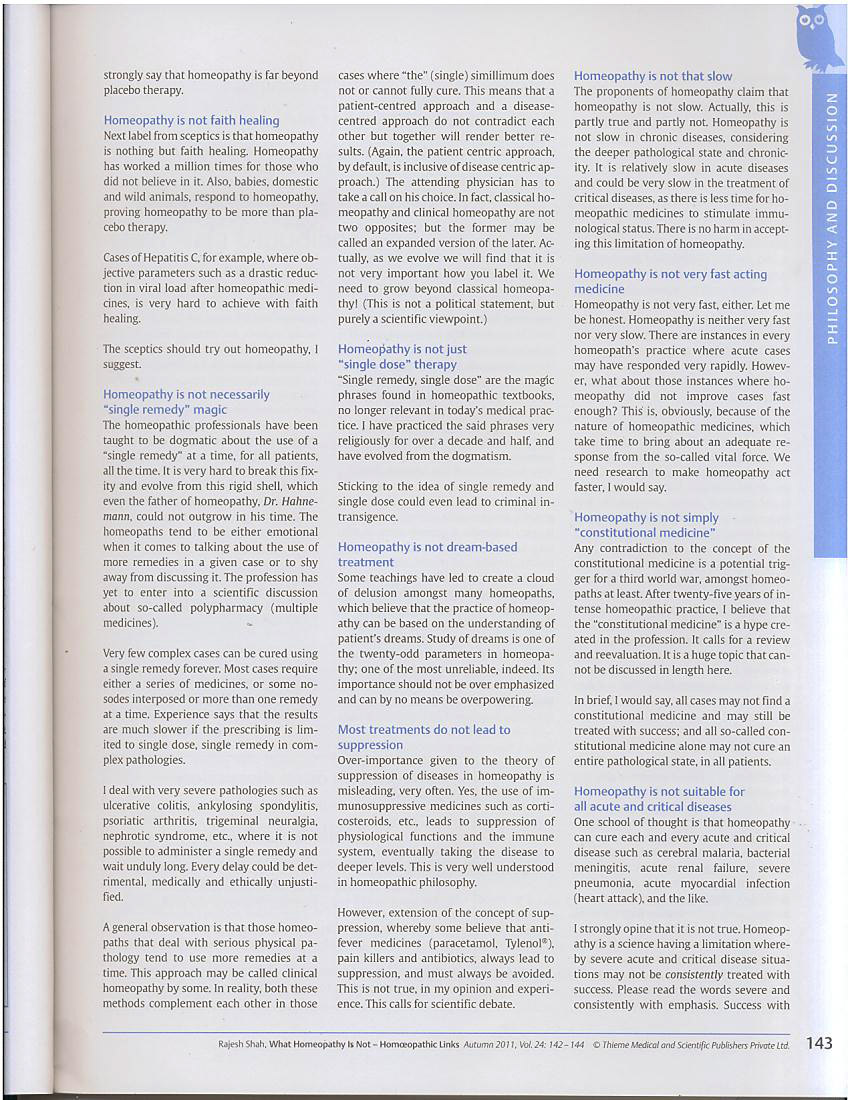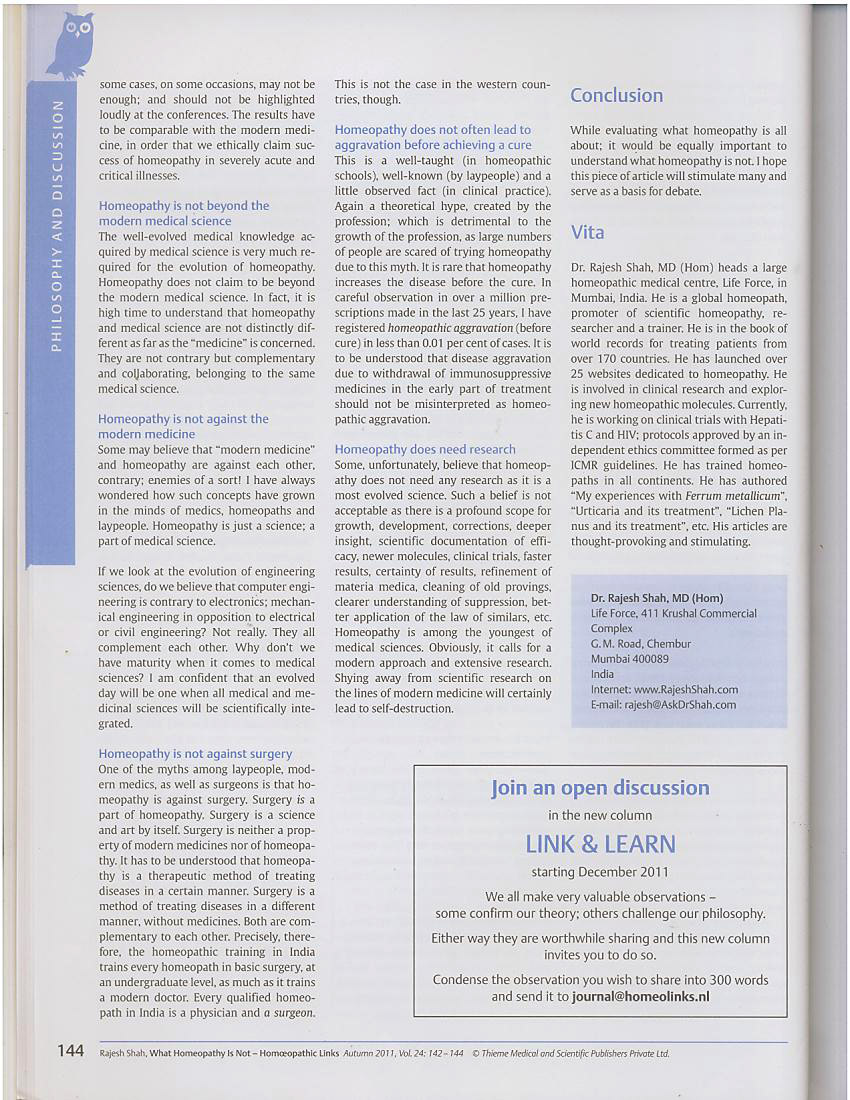



(This article was published in Homeopathy Links, an international journal from Europe, Sept 2011.)
About the author:
Dr Rajesh Shah, MD (Hom): Dr Shah heads a large homeopathic medical center, Life Force, in Mumbai, India. He is a global homeopath, promoter of scientific homeopathy, researcher, and trainer. He is in the Book of world records for treating patients from over 170 countries. He has launched over 25 websites dedicated to homeopathy. He is involved in clinical research and developing new homeopathic molecules. He has trained homeopaths on all continents. He has authored "My Experiences with Ferrum Metallicum", "Urticaria and its Treatment", "Lichen Planus and its Treatment", etc. His articles are thought-provoking and stimulating. He can be reached at: rajesh@AskDrShah.com . His website is www.AskdrShah.com Address: Life Force, 411 Krushal Commercial Complex, G.M.Road, Chembur, Mumbai 400089. India
(Summary: Misconstruction has surrounded homeopathy ever since its inception. Even after 200 years, homeopathy has remained the most misunderstood or ill-understood medical science ever; unfortunately, within the homeopathic profession as well. The diversity of viewpoints on the scope of treatment in the profession may not be a healthy sign for the growth of science. Homeopathy is among the youngest of medical sciences calling for a modern approach and extensive research. Some points related to misinterpretation about various facets of homeopathy, by the homeopaths, are raised and discussed.)
From dictionaries to encyclopedias to websites and books, it is almost explicitly explained ‘what is homeopathy’; however, it is equally important to discuss what homeopathy is not.
Homeopathy is one of the most mysterious science streams, which is highly ill-understood, misunderstood, and over-understood, and hence there exists confusion in the minds of not only the lay people (patients) but also the homeopaths themselves.
After having spent almost three decades in the study, learning, practicing, teaching, promotion, and research in the field of homeopathy, I will rightfully share my thoughts and concerns; explaining what is not homeopathy.
Homeopathy is not a miracle medicine:
Many people believe that homeopathy is a miracle science, it can make the magical cure for even the most incurable diseases such as cancer, comatose stages, paralysis, etc. Actually, it is not. Homeopathy is simply a science based on certain laws (law of similars, comparable with that of vaccinations); with its own scope and limitations. There are rules, parameters, and methods of application, which determine the scope of treatment.
Homeopathy is very effective but please do not expect magic or miracles.
Homeopathy is not a panacea:
One of the myths about homeopathy is that it is a cure for all, a panacea. It is not. Homeopathy enjoys all the joys of the scope of its application, as well as the limitations of the science. No medical science can be a panacea.
Homeopathy can cure the early stages of Rheumatoid arthritis but not the deformities, which go with it, as an example.
Homeopathy is not just mind-based medicine:
One of the hardest concepts about homeopathy is that homeopathy is based largely on the understanding of the mind. The homeopathic fraternity is also not fully saved from this misbelief. The study of mental attitudes, emotions, and mindset is one of the important aspects of patient study in homeopathy. However, it is not the sole determining factor.
Many homeopaths, especially in the Western world, have a delusion that homeopathy is almost identical to mind-medicine. Homeopathy study encompasses, actually, the disease, the nature of pathology, the kind of immunological or hormonal changes, the physical components (perspiration, thermal preference, sleep, etc), and the mental sphere; all or most of them put together, depending on the case.
Homeopathy is more than psychosomatic:
Many homeopaths tend to relate disease or pathology in patients to some emotional parameter, almost always as cause and effect phenomenon. For example, diabetes due to stress in a relationship or arthritis due to grief due to the death of a loved one, etc. Psychosomatism is profoundly comprehended and valued in homeopathy; however, not necessarily a causal phenomenon, but more as a part of the totality. There is no need to forcibly connect major emotions as the cause for the development of every disease in all patients.
Homeopathy is not spiritual:
Since homeopathy is based on the potentized (incredibly minute) dose of the physical substance, which cannot be measured with the current scientific methods, many have theorized and connected homeopathy with spirituality. It seems interesting to read some correlation between the two; however, it may be detrimental for the growth of homeopathy if taken away from science and towards spirituality. Comparing ‘vital force’ with ‘sole’ and miasms with ‘Buddhism’ will take homeopathy away from scientific growth.
Homeopathy is not-yet-fully-understood science, so, to some, it might look like some form of spirituality.
Homeopathy is not placebo therapy:
The skeptics have always criticized homeopathy as a placebo therapy, due to a lack of adequate research as per modern medicine guidelines. Since the results using homeopathic medicines are fairly reproducible, measurable, and documentable, I would strongly say that homeopathy is far beyond placebo therapy.
Homeopathy is not faith healing:
The next label from skeptics is that homeopathy is nothing but faith healing. Homeopathy has worked a million times for those who did not believe in it. Also, babies, domestic and wild animals, respond to homeopathy; proving homeopathy to be more than placebo therapy.
Cases of Hepatitis C, for example, where objective parameters such as a drastic reduction in viral load after homeopathic medicines; are very hard to achieve with faith healing.
The skeptics should try out homeopathy, I suggest.
Homeopathy is not necessarily ‘single remedy’ magic:
Homeopathic professionals have been taught to be dogmatic about the use of ‘single remedy’ at a time, for all patients, all the time. It is very hard to break this fixity and evolve from this rigid shell; which even the father of homeopathy, Dr Hahnemann, could not outgrow in his time. The homeopaths tend to be either emotional when it comes to talking about the use of more remedies in a given case or shy away from discussing it. The profession has yet to enter into a scientific discussion about so-called poly-pharmacy (multiple medicines).
No complex case be cured using a single remedy forever, barring only a few exceptions.
I deal with very severe pathologies such as Ulcerative colitis, Ankylosing spondylitis, Trigeminal Neuralgia, Nephrotic Syndrome, etc. where it is not possible to administer a single remedy and wait. Every delay could be detrimental and not justified.
Homeopathy is not just ‘single dose’ therapy:
‘Single remedy, single dose’ is the magic phrase found in homeopathic textbooks; no longer relevant in today’s medical practice. I have practiced the said phrases very religiously for over a decade and a half; and have evolved from the dogmatism.
Sticking to the idea of a single remedy and single dose could even lead to criminal intransigence.
Homeopathy is not a dream-based treatment:
Some teachings have led to creating a cloud of delusion amongst some homeopaths, who believe that the practice of homeopathy can be based on the understanding of a patient’s dreams. The study of dreams is one of the twenty-odd parameters in homeopathy; one of the most unreliable, indeed. Its importance should not be overemphasized.
Most treatments do not lead to suppression:
Over importance of the theory of suppression of diseases in homeopathy is misleading, very often. Yes, the use of immunosuppressive medicines such as corticosteroids, etc. leads to suppression of the immune system, eventually taking the disease to deeper levels. This is very well understood in homeopathic philosophy.
However, an extension of the concept of suppression, whereby some believe that anti-fever (paracetamol, Tylenol), painkillers, antibiotics, always lead to suppression; and must always be avoided. This is not true, in my opinion. This calls for scientific debate.
Homeopathy is not that slow:
The proponents of homeopathy claim that homeopathy is not slow. Actually, this is partly true and partly not. Homeopathy is not slow in chronic diseases. It is relatively slow in acute diseases and could be very slow in the treatment of critical diseases.
Homeopathy is not a very fast-acting medicine:
Homeopathy is not very fast, either. Let me be honest. Homeopathy is neither very fast nor very slow. We need research to make homeopathy faster, I would say.
Homeopathy is not simply ‘constitutional medicine’:
Any contradiction to the concept of constitutional medicine is a potential trigger for the third world war, amongst homeopaths at least. After twenty-five years of intense homeopathic practice, I believe that ‘constitutional medicine’ is a hype created in the profession. It calls for a review and re-evaluation. It is a huge topic, and cannot be discussed at length here.
In brief, I would say, that all cases may not find constitutional medicine and can still be treated with success.
Homeopathy is not suitable for all acute and critical diseases:
One school of thought is that homeopathy can cure every acute and critical disease such as cerebral malaria, bacterial meningitis, acute renal failure, severe pneumonia, acute myocardial infection (heart attack), and the like.
I strongly opine that it is not true. Homeopathy is a science that has a limitation whereby severe acute and critical disease situations cannot be consistently treated with success. Please read the word ‘consistently’ with emphasis. Success in some cases, on some occasions, may not be enough. The results have to be comparable with modern medicine; in order that we ethically claim the success of homeopathy in severe acute and critical illnesses.
Every disease is not curable, even if the remedy is right
Many people and some homeopaths believe that if the symptoms of the patient match with some medicines, every disease becomes curable. In other words, if the medicine selection is perfect, the cure is certain; irrespective of the nature of the disease. This is not true. The curability of any disease depends on several factors such as 1. Nature of the disease. For example, hepatitis (inflammation of the liver) may be curable; while cirrhosis (scarring) of the liver is not curable. 2. The extent of pathological change. For example, fewer patches of Alopecia Areata (hair loss patches) are curable; but total hair loss (Alopecia totalis) is not curable. 3. Reversibility of the disease process and outcome. Inflammatory arthritis can be helped but Osteoarthritis (bony overgrowth) cannot be reversed. 4. Selection of the correct homeopathic remedies.
Homeopathy is not beyond modern medical science:
The well-evolved medical knowledge acquired by medical science is very much required for the evolution of homeopathy. Homeopathy does not claim to be beyond modern medical science. In fact, it is high time to understand that homeopathy and medical science are not distinctly different as far as the ‘medicine’ is concerned. They are not contrary but complementary and collaborating; belonging to the same medical science.
Homeopathy is not against modern medicine:
Some may believe that ‘modern medicine’ and homeopathy are against each other, contrary; kind of enemies! I have always wondered, how such concepts have grown in the minds of medicos, homeopaths, and lay people. Homeopathy is just a science; a part of medical science.
If we look at the evolution of engineering sciences, do we believe that computer engineering is contrary to electronics; mechanical engineering opposing electrical or civil engineering? Not really. They all complement each other. Why don’t we have maturity when it comes to medical sciences?
Homeopathy is not against surgery:
One of the myths among laypeople, modern medicos, as well as surgeons is that homeopathy is against surgery. Surgery is a part of homeopathy. Surgery is a science and art by itself. Surgery is neither a property of modern medicines nor of homeopathy. It has to be understood that homeopathy is a therapeutic method of treating diseases in a certain manner. Surgery is a method of treating diseases in a different manner, without medicines. Both are complementary to each other. Precisely, therefore, the homeopathic training in India trains every homeopath for basic surgery, at the undergraduate level, as much as it trains a modern medico. Every qualified homeopath in India is a physician and a surgeon. This is not the case in the Western world, though.
While evaluating what homeopathy is all about; it would be equally important to understand what homeopathy is not. I hope this piece of article will stimulate many.